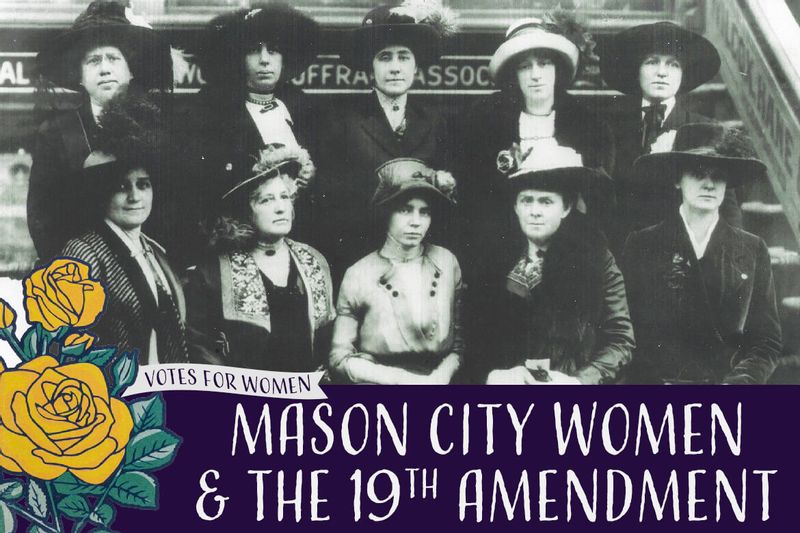Part 2: Mason City Women and the 19th Amendment

In 1903, a county suffrage convention was held in Mason City. Eleanor Stockman, wife of a local physician and one of the town’s most active suffragettes spoke to the large crowd. In part, she said, “The question of rights is a profound one and is not easily defined. The popular insistence has evolved the democratic form of government and the writers of the Declaration of Independence were correct when they demanded independence for all and equality for all. Why woman was left out when a democracy was formed can be explained by the fact that the mind of man was still in evolution of liberty… “Suffrage implies a rational choice. A mature. sane, competent person who is an integral part of society and a citizen of democracy should have the right of suffrage. Progressive forces will evolve conditions which will emancipate women, for ‘through the ages one increasing purpose runs, and the thoughts of man are widened with the process of the suns.’ (Tennyson).”
Another speaker was Mrs. J. H. (Mable) Gale, wife of a local dentist and daughter of ardent suffragist and local community leader Mary Emsley Adams. Her topic: “Does the Wife Need the Ballot?” Among her numerous arguments was the following: “Those who oppose the suffrage for wives have brought forward as many arguments as there are types of men, some from the most selfish and narrow convictions possible to conceive: other from conscientious but mistaken motives of the best end to be obtained. If husband and wife voted alike would not it result in merely doubling the number of ballots cast without affecting the result? If they did not vote alike would it not be a powerful instrument of discord in the home? I am inclined to think where husband and wife do vote alike it would be on the right side, since wives occupied with home duties for that reason free from all motives of self-aggrandizement, have everything to lose and nothing to gain by the election of dishonest and immoral men. If this resulted in doubling the good votes, I guess we need not worry. If it is a fact that a husband and wife cannot vote different tickets and live in peace, I have only this one thing to say: if they would quarrel over that, they are quarreling at the present over anything and everything.”
When Susan B. Anthony died in 1906, the Mason City Suffrage Club held a tribute in her honor. A packed house heard local speakers, both men and women, talk about the impact of Anthony’s work. Julia Dakin’s (a local suffragist) address was titled “Miss Anthony the Leader,” while J.J. Clark (local judge) spoke about “The Heroic Woman.” J.E.E. Markley’s (prominent attorney and member of the Iowa House of Representatives) words centered on “The Debt We Owe to Miss Anthony, the Woman.” Mrs. Alice Remley also spoke in tribute while Miss Steven’s talked about women’s rights in other nations. Local musicians and vocalists took part in the memorial. The full house and the equal participation of both sexes was a strong indication of local support for the suffrage movement
Mason City women were not just attending local and county meetings but state and national conventions as well. They traveled by train from nearby conventions to places ranging from Minneapolis to New York and Washington D.C. Julia Dakin even sailed the Atlantic first to Paris to meet with and lunch with other suffragists before they traveled on to London for the British National Convention. At one state convention, the arguments over who should chair the sessions were so loud and nearing violence among the women that Mary Emsley Adams stood and essentially told them to shut up and she would temporarily chair the meeting. She was so well respected and had held so many local and state offices in the movement that they quickly complied.
ABOUT THIS SERIES: To commemorate the 100th anniversary of the 19th amendment, Visit Mason City is sharing a 5-part series of articles about the Mason City women who made many contributions to the Women’s Suffrage Movement. Many thanks to Pat Schulz for sharing these stories.
ABOUT THE AUTHOR: Pat Schultz, former executive director of Wright on the Park, found her interest in women in Mason City sparked when she was researching Mary Emsley Adams. Mrs. Adams was the president of the City National Bank when its board hired Frank Lloyd Wright to design a new building. She was also, as Pat discovered, an ardent suffragist, so active that she was recognized as one of the 24 Iowa women honored for their outstanding efforts when the 19th amendment was ratified. Pat’s continued research found that Mary was not the only local woman deeply involved in getting the vote for women. Her book “Amazing Women of Early Mason City” tells their stories as well as those of other women. Pat began her work with Wright on the Park after she retired from teaching in the language arts department at Clear Lake High School for 29 years. She has also taught communication skills for North Iowa Area Community College and currently teaches in NIACC’s Life Long Learning Program. A widow, she lives on an acreage northeast of Mason City with her feline friends, Katzanova and Charles Dickens. She also continues to be a member of WOTP’s Education Committee.

5.0 (19 Reviews)
Visit Mason City
13 North Federal Avenue
Mason City, IA 50401-3221
641-422-1663
www.visitmasoncityiowa.com
